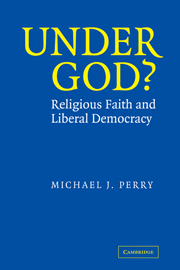Book contents
- Frontmatter
- Contents
- Introduction: The Controversy over Religion in Politics
- I Mainly for the Agnostics and the Exclusionists
- 1 What Does the Establishment Clause Forbid? Reflections on the Constitutionality of School Vouchers
- 2 Why Political Reliance on Religiously Grounded Morality Does Not Violate the Establishment Clause
- 3 Why Political Reliance on Religiously Grounded Morality Is Not Illegitimate in a Liberal Democracy
- II Mainly for the Agnostics and the Inclusionists, Especially Inclusionists Who Are Religious Believers
- Conclusion: “This Nation, Under God”
- Notes
- Index
3 - Why Political Reliance on Religiously Grounded Morality Is Not Illegitimate in a Liberal Democracy
Published online by Cambridge University Press: 05 June 2012
- Frontmatter
- Contents
- Introduction: The Controversy over Religion in Politics
- I Mainly for the Agnostics and the Exclusionists
- 1 What Does the Establishment Clause Forbid? Reflections on the Constitutionality of School Vouchers
- 2 Why Political Reliance on Religiously Grounded Morality Does Not Violate the Establishment Clause
- 3 Why Political Reliance on Religiously Grounded Morality Is Not Illegitimate in a Liberal Democracy
- II Mainly for the Agnostics and the Inclusionists, Especially Inclusionists Who Are Religious Believers
- Conclusion: “This Nation, Under God”
- Notes
- Index
Summary
INTRODUCTION
In this chapter, as in the preceding one, I am concerned with the legitimacy of political reliance on religiously grounded morality. In the preceding chapter, I was concerned with legitimacy in the sense of consistency with the nonestablishment norm; here, I am concerned with legitimacy in the sense of consistency with the morality of liberal democracy. The two main questions I address in this chapter are these:
Do citizens or their political representatives contravene the morality of liberal democracy by relying on religiously grounded moral belief in public discussions about whether to outlaw or otherwise disfavor conduct (abortion, for example, or same-sex unions)?
Do legislators or other policymakers contravene the morality of liberal democracy by outlawing or otherwise disfavoring conduct on the basis of religiously grounded moral belief?
Assume that, as I argued in the preceding chapter, government officials do not violate the nonestablishment norm by disfavoring conduct on the basis of religiously grounded moral belief. This leaves open the possibility that government officials nonetheless betray the morality of liberal democracy by doing so. In my judgment, however, which I defend in this chapter, the morality of liberal democracy does not forbid legislators or other policymakers to disfavor conduct on the basis of religiously grounded moral belief. (I clarified, at the beginning of the preceding chapter, what I mean by “religiously grounded” moral belief and by making a political choice “on the basis of” such belief.
- Type
- Chapter
- Information
- Under God?Religious Faith and Liberal Democracy, pp. 35 - 52Publisher: Cambridge University PressPrint publication year: 2003



